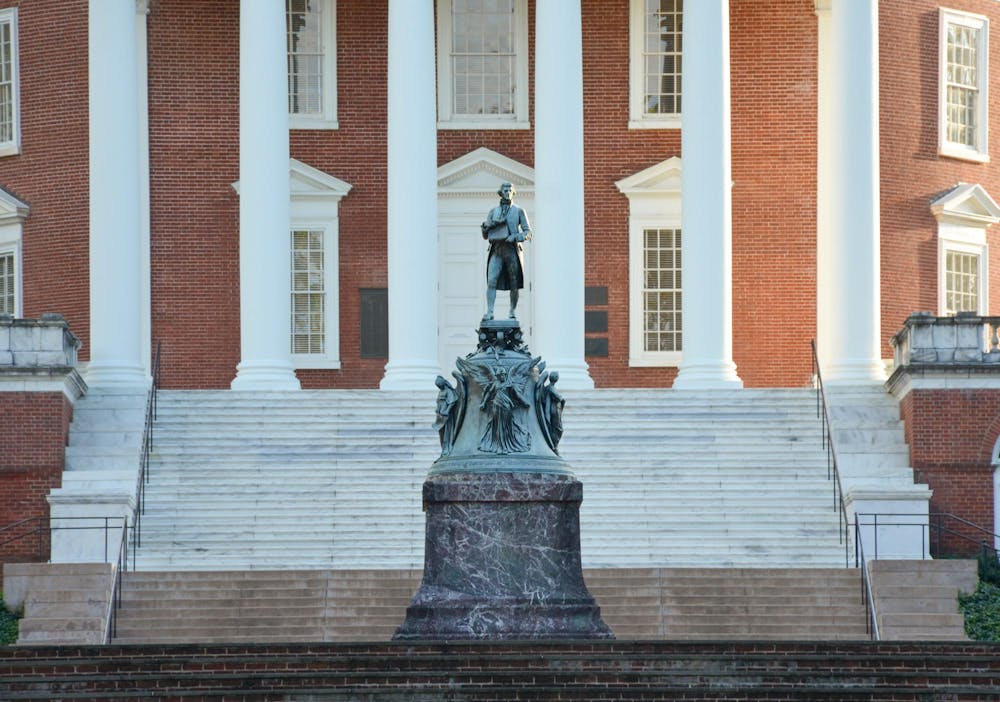Editor's Note: The language in this article was finalized by the author Oct. 24.
Oct. 22, 2025, the rector and Board of Visitors of the University signed an agreement with the Department of Justice. In the University’s press release announcing the deal, Board Rector Rachel Sheridan is quoted as saying, “The agreement results from steadfast adherence to the same values that have guided generations of U.Va.’s leaders and that we have honored as stewards of that legacy.”
At first glance, the University’s agreement with the DOJ may seem like a reasonable deal. The University’s press release asserted “[t]he agreement includes no monetary penalty and no external monitoring, and it affirms UVA’s academic freedom.” However, a comparison of the terms of U.Va.’s agreement with the Department of Justice to those signed by Brown University and Columbia University reveals what Interim University President Paul Mahoney and the Board chose to protect — and more importantly, what they were willing to sacrifice.
Under the terms of their agreements with the federal government, Brown and Columbia agreed to follow civil rights law. In contrast, the University agreed to comply with the expansive scope of the Department of Justice’s interpretation of civil rights law. Specifically, the University agreed “to apply Civil Rights Law internally according to the Department of Justice’s ‘Guidance for Recipients of Federal Funding Regarding Unlawful Discrimination’ of July 29, 2025, so long as that Guidance remains in force and to the extent consistent with relevant judicial decisions.” Mahoney and the Board have agreed to allow the DOJ, rather than the courts or the Constitution, to define what civil rights law is.
Brown and Columbia have due process protections built into their agreements with the federal government. Brown’s agreement protected their notice and opportunity to cure rights, and Columbia’s agreement incorporated an independent monitor and a dispute-resolution process. In contrast, the University’s agreement is completely devoid of due process protections. The University has no right to a hearing, no right to appeal and no neutral fact-finder. The Department of Justice gets to determine whether the University is “making sufficient progress.” Mahoney and the Board have agreed to accept federal oversight under standards that the DOJ alone can define and enforce, with no procedural recourse for the University.
Brown and Columbia’s agreements specified that their pending investigations were resolved. In contrast, all five of U.Va.’s pending investigations remain open but “suspended.” The DOJ retains the right to un-pause any or all of those investigations at any time. Mahoney and the Board have agreed to a standstill agreement that failed to resolve any of the pending investigations.
Unlike Brown and Columbia’s presidents, the University’s president must certify a quarterly report “under penalty of perjury,” making the University’s president liable for any perceived noncompliance, even in areas of interpretation rather than fact. Mahoney and the Board have agreed to obligate the University’s president to personally attest, under penalty of perjury, to the University’s adherence to standards that only the Department of Justice can define.
Unlike Columbia and Brown, the University is required to report its compliance directly to the assistant attorney general of the civil rights division. Columbia reports its compliance to an independent monitor, and Brown reports its compliance to a lower-level administrative office. It seems disingenuous for the University to boast about its agreement having “no external monitoring,” since the University’s president is required to report compliance — and certify under penalty of perjury — directly to Harmeet Dhillon.
So, what did Mahoney and the Board choose to protect? Measured in dollars, the University’s deal looks good compared to the deals for Brown and Columbia. Measured in institutional independence, though, the University’s deal is by far the most costly of the three.
In “Notes on the State of Virginia” (1785), Thomas Jefferson wrote that “it is error alone which needs the support of government. Truth can stand by itself.” By binding the University to the Department of Justice’s interpretation of the law, Mahoney and the Board have confused compliance with truth, and surrendered both.
Kimberly D. Acquaviva, PhD, MSW, CSE, FNAP is the Betty Norman Norris Endowed Professor of Nursing at the University of Virginia. She can be reached at opinion@cavalierdaily.com.
The opinions expressed in this guest column are not necessarily those of The Cavalier Daily. Columns represent the views of the author alone.







